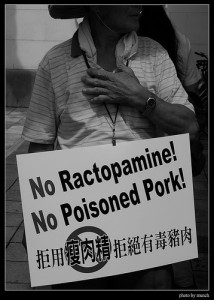Ractopamine, a leanness-enhancing feed additive, is banned in Taiwan and more than 150 other countries; some shipments of United States (US) beef were banned from entering Taiwan upon discovering traces of ractopamine in meat last year.
However, under pressure from the US government, the newly elected Taiwanese President Ma Ying-jeou is now considering lifting the ban. Taiwanese consumers and farmers are unhappy about such a move and a civic coalition has been established to counteract it.
Additive controversy
Ractopamine was developed by an American pharmaceutical company, Elanco Animal Health, a division of Eli Lilly and Company. It is used in the feeding of pigs, cows and turkeys for improving “feed efficiency” and enhancing “carcass leanness” in meat. The Food Standards Agency, Codex Alimentarius, did not have a consensus on the maximal residual level (MRL) of ractopamine yet. The Codex Alimentarius will continue its discussion on the MRL of ractopamine in July, 2012.

Taiwanese farmer protests against Ractopamine use in 2007. Photo by Flickr User munch999 (CC BY-NC-SA 2.0)
US beef has been one of the most controversial issues in its free trade negotiations with other countries. Recently, Japan has also opened its beef market and allowed ractopamine to be present in the imported meat, but banning the use of ractopamine in domestic pork and beef production.
A similar understanding has taken place between the US and Taiwan under the Trade and Investment Framework Agreement (TIFA) since mid 2000. The US government has been pressuring Taiwan to lift the ban on ractopamine and the restriction imposed on US beef after the outbreak of mad cow disease in 2003.
However, the evaluation of the MRL of ractopamine in 2006 failed to remove ractopamine as banned drug against the background of the social panic raised by the clenbuterol poisoning incidence that happened in China. In 2007, when the government again tried to lift the ban on ractopamine, the then opposing party, Kuomingtang, in Legislative Yuan stood by the country's pig farmers [zh] and stopped the motion.
Don Shapiro from the American Chamber of Commerce in Taipei revealed that the Kuomingtang, under the pressure from the US government, would started to work on lifting the ban on ractopmine again after they won the presidential election in 2012:
The U.S. government by early 2011 was willing to start preparations to resume TIFA talks. Then another obstacle arose when Taiwan rejected some shipments of beef found to contain traces of the leanness-enhancing feed additive ractopamine…Whenever questions were raised last year about finding a solution to the impasse, Taiwan officials responded that nothing could be done before this January’s elections, for fear of sparking protests from consumer and farming groups that could escalate into a campaign issue.
An international academic conference on the additive organized by the Department of Health in April and May 2012, has been criticized [zh] as the government's attempt to educate the public on the safety of ractopamine and create a public consensus on the ban lifting. In reaction to the government's move, more than 20 civic groups, from the consumer, animal rights, environment and agriculture sectors, have formed a coalition [zh] to stop it.
Citizen media reactions
One of anti-US beef corner's concern is about the adverse effect of the additive on human health and food security. Although there are studies showing that the acceptable daily intake of ractopamine is up to 60mg, Taiwanese toxicology expert, Dr. Lin has pointed out [zh] that this level is set for healthy people because the human study of ractopamine is not considered to be complete. For those who have cardiovascular disease, a 6mg acceptable daily intake might still be too much.
Citizen reporter, Cliteir Chen from News Market points out [zh] that the government should not betray people's health for diplomatic consideration:
許多人質疑,瘦肉精開放與否,從來就不是「能不能添加」、「要不要進口」那麼單純的問題,而是被外交、貿易政策綁在一起的複雜問題。但對全民來說,這僅僅就是最單純的食品安全議題,當我們強調飲食回復天然、少吃添加物之際,為何不是維持十多年來「零瘦肉精的」堅持?
即使萊克多巴胺「沒那麼毒」,但不要忘記國人有不吃有毒肉品的權益,這也應是政府的義務。
Because the FDA has received a lot of complaints from the pig raisers who fed their pigs with ractopamine, animal rights activists have also joined the debate [zh]:
這種「速養」以換得「快錢」的邏輯,正彰顯出資本主義體制最殘酷的一面。也就是,為了追求最快速、最大量的利潤,可以以動物的痛苦、人類的健康、生存環境的破壞做為代價。…反對美牛,還包括反對這樣的生命態度!
Yu Fu-Ching from News Market reflects upon [zh] modern people's eating habit:
當大家激烈討論「瘦肉精到底有沒有毒」、「瘦肉精安全用量」之際,大家有沒有想過,我們難道不該回到源頭問:為什麼飼養動物需要使用瘦肉精?為什麼人們對肥肉避之唯恐不及?難道肥肉對健康的危害高過萊克多巴胺?過去我們認為肥肉一無是處、是健康危害的想法真正的正確嗎?
一個簡單的邏輯:吃好的食材,是健康飲食的第一步。蔬果如此,肉品也如此。而什麼是好食材?毫無疑問,天然不添加是構成好食材的第一要件。因此,自然養殖、不使用瘦肉精,呈現天然肥瘦比的肉品,無疑是最佳的脂肪與蛋白質來源。







1 comment